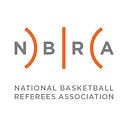One NBA Referee’s Road to the NBA Driven by His Love of Learning
Before the Whistle with Eric Lewis
Eric Lewis is currently finishing up his 14th season officiating in the NBA. A former player, Eric got his officiating start while attending HBCU Bethune-Cookman College (now Bethune-Cookman University). While attending BCC, Eric was not only a student-athlete on track to graduate with a double major, he was also a small business owner. A man with many passions, Eric’s main driver in life has been his love of learning.
Q: Did you have a different career before getting into refereeing?
E: “No other career, but I did have a passion for engineering. When I was in school, I was a double major, engineering and math. I always wanted to open up my own business and thought engineering would be a good field to go into. In college, I opened a record store. I was DJ’ing, selling CDs and DVDs to generate money. We did parties for the school, and any other functions that required a DJ. We promoted concerts and things like that. I never had a so-called profession, so to speak. I got into refereeing once I finished playing basketball. I developed a strong passion for (refereeing) and realized that’s what I wanted to do. Once that took off, I left the business to my partner.”

Q: What was your path to officiating?
E: “Well, it started off with a local referee by the name of Alan Hannah, who was looking for local talent trying to get me involved. He remembered me from my playing days. I played at Bethune-Cookman University when it was Bethune-Cookman College, that’s how old I am. He asked me to come to a camp that they were hosting run by JB Caldwell, who is now a scout for the NBA’s referee program. He was trying to get ex-players to start officiating locally. I really started (officiating) at that camp. Going in there that first day, I didn’t know anything about refereeing, but I did pretty well. Not only was I eligible to do high school, but I was hired at my first junior college conference from that camp. That was a good experience for me, and a little bit of motivation too. So I started high school and every year my career progressed with the levels of officiating; from high school to junior college, to NAIA to Division II, to lower D I. Then I got into the D-League (currently G-League) my third year refereeing. That was actually the year they started (the D-League). And from there it just progressed to the NBA.”
Q: Growing up, did you think about becoming a professional referee?
E: “No, I didn’t know any referees. I only saw the referees when I played. I did not know anything about their career and what it encompassed or the magnitude. Plus, I thought referees were cornballs, that they did not know anything about the game. I thought I knew more than them. They did not look athletic, or like they were players or coaches before. They knew more than what I perceived they knew, so it was a totally different perspective than what I have now. Plus, they actually read the rule book.”
Q: What was the tipping point when you decided you wanted to pursue refereeing instead of a career in engineering and math?
E: “Actually, it was at camp back in 1996 that I just saw a different side of basketball. I’ve been in this game for all my life. At camp, I didn’t know anything about it! It was that learning aspect that took over for me. Some referees call it ‘the bug.’ It took over, and that’s what I wanted to do. I never saw myself as an NBA referee. That was never my goal. It was just to referee high school, because of the guys I dealt with. Then I met the SEC referees, and I then said, ‘I want to be in the SEC too,’ so then that was my goal. I never knew anything about the NBA, and then you know, you start hearing things about it, getting introduced to it and going to camps where the NBA referees taught and you’re like, ‘wow, I want to try that.’ Then I got invited into the summer league. From there, (the league) called me and said, ‘do you want to be part of the first-ever development league?’ And I was like, well yeah! And then it just took off.”
Q: What advice do you have for someone who is trying to officiate full-time but may have multiple passions like yourself?
E: “You have to understand what you are willing to sacrifice. I don’t think your first passion ever leaves, I think it’s still there, so you have to balance that and navigate it in a way you are happy with yourself when you look back at your choice instead of regret.”
Q: How would you say that you balanced those two passions?
E: “It was pretty easy for me because I had my own business. I was able to adjust my schedule to fit refereeing. The funny thing is that I don’t really listen to music anymore. What I do now is I have a piano at my house, well, a keyboard. I watch YouTube videos, and that’s how I learned to play the piano. I want to learn how to play the saxophone and get a guitar. I would like to learn to play smooth jazz. I want to be able to play more than I want to listen to it. I want to give people that same feeling that I had back when I listened to music. I couldn’t tell you the latest artist or the newest rap songs. So it’s very strange.”
